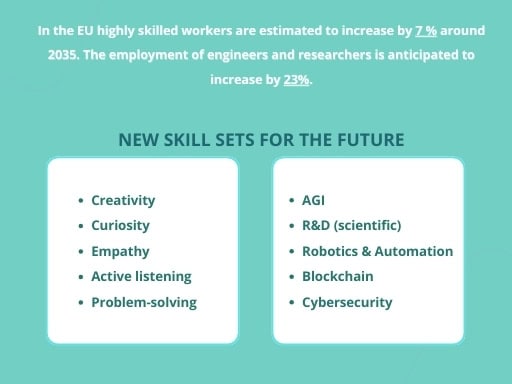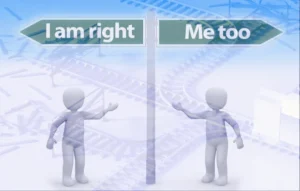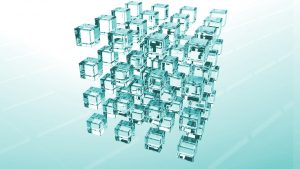Acquiring new skill sets can feel like stepping into uncharted territory, but it’s also an opportunity to reach beyond our boundaries and strive for our best. In these changing times, it’s essential to rely on our strengths and personal values and remember that our potential to adapt isn’t effortless but timeless.
According to an EU survey jobs for highly skilled workers are estimated to increase by 7 % around 2035. The employment of engineers and researchers is anticipated to increase by 23%. Also, assemblers’ jobs are to increase by 17% along with the new skills needed for using digital tools for assembling.
US estimated employment of IT&C research scientists from 2022 to 2032 is 23%, with an average pay of $136,620 yearly. Technological discoveries and new social and economic trends will always create demand for new skills. Some tech changes are more radical and dramatic than others, affecting people on more than one occasion. Due to constant new tech novelty, most organizations are already integrating these rapid changes.
Skills trends and AI development
As always, there are several contradictory views on what the future of work might bring. Predictions about AI development say that on average approximately 30% of current jobs will disappear by 2030. On the contrary, others say that AGI will actually help create approximately 250 million jobs.
Due to AI adoption developing AI skills to improve employability and prepare for an automated job market is a priority for learners in 2025. Coursera estimates that AI and ML (machine learning) specialist roles will grow by 40% over the next four years. Also, there is a high demand for GenAI, cybersecurity, and data-based skills because most employers decided to foster AI capabilities.
According to a Pluralsight tech trends report for aspiring developers, landing a job will be more difficult. AI can substitute junior developers and now they are competing with skilled professionals to find work. To get hired, junior developers need skills comparable to those of an experienced software engineer.
Developers must work with AI agents and coding assistants to refine their code review skills and efficiently identify bugs. It seems that the top skills in 2025 are AI Agents, LangChain, Kubernetes, and cloud services (AWS, Azure). However, the good news for beginners is that only 12% of IT professionals have significant experience working with AI.

New Skill Sets for the Future and New Challenges
Now, in-demand jobs are either at the lower end of skills requirements and complexity or at the higher -end. There are either jobs involving vocational education in construction and installation areas or high-skill roles in research requiring a scientific background.
Obviously, the way organizations acquire talent is affected in the long term. But this is hardly a novelty because we always have to deal with changes. As always, we’ll need encouragement and support to keep up with new technology and develop new skills. In recent years, skills changes have come with complex social issues correlated with health crises, the ageing population, and climate change. Recently, AGI advancements have placed a lot of pressure on the global job market.
However, the lack of proper working conditions, low salary levels and the employers’ inability to attract skilled talent are also causing skills shortages. Ironically enough, the current global trend in hiring due to the current job demands is actually the skills-based approach. Hiring based on the skills approach is related to valuing people who have and practice the ability to learn and adapt. Organizations that develop an agile workforce will be capable of meeting future challenges.
The skills-based approach hiring trend
Skills-based hiring is not a trendy approach, but a strong building block strategy of organisational growth. Performance hiring will always consider specific skills as a minimum employment requirement. Due to the high demand for particular skills, talent acquisition changed focus and prioritized skills over education or credentials. Eurobarometer shows that SMEs face a skills shortage of 20% for R&D jobs, 18% for IT, 12% for marketing and 8% for HR experts.
However, a real solution to tech innovation disruptions has been a systematic adaptation through learning and new skills development. New skills and knowledge development are embraced by a small part of employers. According to the Gallup World Poll, only 32% of employees worldwide currently work in an environment that fosters their development.
In times of crisis or radical changes, we are always coming back to the building block of things. In the job market, the skills frameworks are the basis of any occupation. On a larger scale currently, some organizations are creating skills-based models to align themselves with the skills-based approach and generate competitive skills talent pools.
The main objective of skill-based models is the idea that learning and development opportunities will help people develop new skill sets, perform better or prepare for a career change. Learning new skills and facilitating different career paths is based on the skills gaps identified at the organizational level. Skills models are intended to help build detailed skill sets and proficiency frameworks. A clear and well-crafted set of skills will contribute to making strategic decisions about talent development.
Soft skills and hard skills
The soft skills we acquire through our lives and in different workplaces demonstrate how we carry our responsibilities and are related to personality traits, personal attributes, and attitudes towards life. But, beyond the tech or hard skills that we need for every kind of occupation or career path we pursue, there is a set of skills that is unique to each and every one of us. This set of skills comes from the life experiences and circumstances we gather throughout our life circumstances.
In the context of AI evolution, a strong set of soft skills might be an advantage and contribute to a positive mindset for facing work challenges. Different sets of skills, less or more complex, can be periodically improved. Transfering lifelong skills into work environments can increase career success.
Soft Skills for the Future
Because of artificial intelligence’s evolution, our world is changing faster than expected. In almost every field of work where repetitive tasks might be automated and jobs are at risk. A survey showed that 65% of organisations are already forecasting results for their AI generative initiatives.
Some future of work predictions say that by 2030, jobs as we know them now will cease to exist. AGI, robotics, and automation will convert them into a huge database of soft and hard skills. Along with benefits like less manual work, improved quality of life, and more free time, AI is also a huge challenge for humanity.
Tech skills are in high demand, more precisely the advanced tech skills in math, health, life sciences, machine learning and, AI research. Creativity, curiosity, and emotions are skills and personal traits that make us who we are and will count in the future.
Soft skills transformation
Soft skills transformation over time best example is remote collaboration. Remote collaboration is now a hiring requirement on job ads. It also involves other skills like communicating with team colleagues and sharing virtual working space, information and work progress. Remote work has made it possible to build teams across the globe and work in sync no matter the time and space.
In these strange times, we should remember that certain personal attributes and soft skills, such as problem-solving, empathy, and active listening, are evergreen. Learning new skills is like taking a plunge into the unknown universe. But it’s also a chance to surpass our limits or at least to do our best.
However, as incredible non-artificial intelligent human beings living on this planet, we might unlock potential and new possibilities and shape the world in surprisingly positive ways. Hopefully, we’ll become wiser in using our creativity and native intelligence to find solutions and not take the road to a dystopia.





